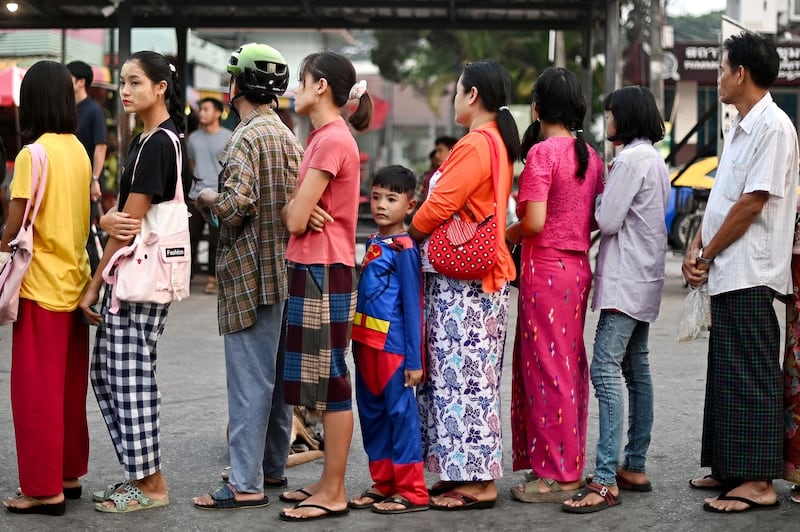Myanmar’s shadow government has called on Thailand to exclude Myanmar junta from involvement in administering the affairs of migrant workers in Thailand, saying the regime is unfairly taxing them in order to prolong its grip on power.
Thailand is home to about two million documented workers from Myanmar, with jobs in agriculture, fishing, manufacturing and other sectors, and many sending funds home to support families as Myanmar’s economy languishes in the aftermath of a 2021 coup.
While many Myanmar workers arrive under an exchange system, others slip across the border without paperwork hoping to get a so-called Certificate of Identity, or CI, issued by either a Thai government office or the Myanmar embassy in Bangkok, allowing them to stay and work.
The National Unity Government, or NUG, set up by pro-democracy politicians after the 2021 coup, said the authority of the junta embassy in Myanmar to issue the certificates gives it the opportunity to exploit “oppressed Myanmar migrant workers and expatriates in all means.”
“The National Unity Government would like to urge the [Thai] government, the house of representatives and parliament, concerned bodies and people of Thailand who prioritize the basic human and labor rights not to allow the Myanmar military junta’s violations in free and fair Thailand,” the NUG said in a statement.
The role of the embassy in issuing the certificates, one of the first steps that migrants take towards establishing themselves legally in Thailand, became even more important last month when Thailand closed seven of its eight offices for issuing the certificates, meaning they are only available through a center in Samut Sakhorn city and the embassy in Bangkok.
The NUG said the embassy was unfairly asking for extensive paperwork, when the CI system was set up to process undocumented migrants.
“It is completely different from the original intention of issuing CI cards for those who cannot provide any documentation,” the NUG said, adding that if migrants had the necessary paperwork, the embassy should be issuing them passports.
RELATED STORIES
[ Shuttered Thai offices leave Myanmar migrants in legal limboOpens in new window ]
[ Migrant workers risk missing out on Thai minimum wage risesOpens in new window ]
[ Myanmar’s junta halts passport conversion as Thailand mulls worker amnestyOpens in new window ]
‘Perpetuation of power’
In September last year, as Myanmar's economic crisis worsened, the ruling military council demanded that overseas workers remit at least 25% of their salary to families in Myanmar through banks and services approved by the junta at an artificially low exchange rate.
Later in the year, the junta announced that any worker applying for documentation, including CIs, at the Bangkok embassy would also be required to pay taxes to the junta in addition to their Thai taxes.
The embassy was “exploiting the hard-earned wages of migrant workers with the intention of creating a stream of revenues to use in their brutal terrorism,” the NUG said.
“Forcibly collecting income tax from the salary of expatriate citizens, pressurizing them to send remittances to families through banks and financial services companies that they designate is only aimed at their interests and perpetuation of power,” it said.
The Myanmar embassy in Bangkok did not immediately respond to a request for comment.

Yamone, a Myanmar national who received her CI in May, told Radio Free Asia that in order to get her documentation, she had to begin paying into the junta’s tax system, amounting to a quarter of her income.
“We are currently living in Thailand, so we don’t want to pay taxes to Myanmar, but we continue to pay them,” Yamone said.
The NUG urged the Thai government to stop the junta collecting income tax from Myanmar citizens in Thailand, saying there was already an agreement not to double-tax Myanmar workers. It also called on Thailand to issue identity cards to migrant workers allowing them to stay.
Kyaw Ni, deputy minister for the NUG’s Ministry of Labor, told RFA that although Thailand continued to engage with the junta, the NUG also spoke with the ministry through intermediary organizations to try to make its case.
“Although there have been no direct discussions with the Thai labor ministry yet, we have held two online meetings with the Committee on Labor of the Thai parliament,” Kyaw Ni said, adding that the NUG had also held talks with the Thai foreign ministry on migrant workers.
Edited by Taejun Kang.
